top image credit: Photo by Mr Cup / Fabien Barral on Unsplash
Racism is not dead [in America], but it is on life support — kept alive by politicians, race hustlers and people who get a sense of superiority by denouncing others as “racists.”
— Social researcher and economist Thomas Sowell—
Overview: Critical race theory (CRT), a godless ideology that is popular today even among many prominent evangelical leaders, seeks to make white Christians feel guilty rather than thankful God has blessed them. The goal is to shame them as “racists” who supposedly have selfishly benefitted from a cultural system that favors them over blacks and other minorities. Yet an objective look[51] at the facts tells us that even though racism hasn’t totally been eliminated, America in the 21st century isn’t a racist county. Actually, a significant amount of racial tension continues to come from the advocates of CRT themselves — people who claim to be working to eliminate racism! Against the backdrop of these cultural forces, everyone will do well to learn about and heed the example the Pilgrims set in the New World in the early 17th century. They demonstrated gratitude to God and found common ground with nearby native Americans. They even welcomed one of them into their own community as a brother.
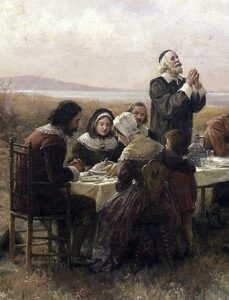
At Thanksgiving, we naturally are compelled to reflect on the historical record regarding the Pilgrims and their experience in the New World, especially during the first two or three years following their arrival at Plymouth. This is especially important because of wide-spread nefarious efforts in our day to rewrite history in order to push socialist and Marxist agendas. Yet the authentic historical record testifies that the lesson the Pilgrims offer is essential for us, especially in light of the cultural winds we face today.
In chapter 1 we summarized William Bradford’s account of the Plymouth Settlement’s experiment in socialism.[52] That two-year venture completely failed,[53] so in 1623 Bradford replaced it with a free-market economy model that affirmed private property rights and natural incentives to work and produce. Immediately and markedly, things changed for the better for the fledgling community. Despite leftist claims[54] that attempt to refute the historical record, Governor Bradford himself attests to what happened in his account of Plymouth titled Of Plymouth Plantation.[55] Socialism didn’t work because it doesn’t work.
Socialism didn’t work because it doesn’t work.
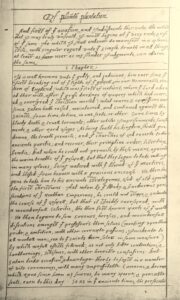
In chapter 2 we began to deal with another ideology that has ties to Marxism and cultural Marxism—critical race theory (CRT). We gave special attention to how CRT is used by social justice warriors (SJWs) in evangelical churches to make white Christians feel guilty for being the beneficiaries of God’s blessings. Relying on CRT, SJWs accuse whites of being racists and of oppressing minorities, especially blacks, through a cultural system that supposedly favors them over people of color. This “systemic oppression” is assumed to be real despite the significant progress Americans have made in improving race relations since the end of the Civil War, and especially in the last sixty or so years.
Here, in chapter 3, we will refute CRT by citing the example the Pilgrims set in giving thanks to God and in relating to the Native Americans among them. Buckle your seat belts and get ready for a ride you’re going to remember for a long time!

The Mayflower arrived at Plymouth on November 11, 1620.[56] Imagine you’re reading William Bradford’s own account (a portion of which we are lifting from chapter 1). He’s using contemporary English to report on his and his fellow Pilgrims’ experiences over the first few months.
The winter of 1621 was especially cruel. Of our party of about 102, half died.[57] My beloved wife Dorothy was one of the first. She was on the Mayflower and fell overboard into Provincetown Harbor on December 7, 1620, before the start of the new year; but a great many of us grew sick and perished during the cold winter months. January and February were especially difficult; on some days as many as two or three of our number passed into eternity.[58] And during the worst of it, only about six or seven were well enough to care for the sick and do necessary chores. [59]
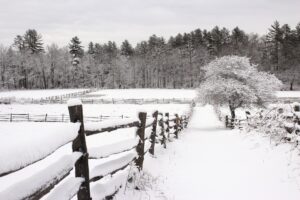
Winter, however, did not last forever. When spring at last arrived, God blessed us with an alliance with the neighboring Indians. One of them, Squanto[60]… became, not just a friend, but also a brother. His tribe, which a few years before had occupied the very land on which our settlement now was rising, had been wiped out by a plague. Had Squanto not been kidnapped and taken to Europe, he too would have died. He was able to make it back to his home, only to discover when he arrived that none of the members of his tribe had survived. We became his new family.[61]
It is difficult to imagine that these events occurred by chance. Squanto spoke English fluently.[62] He knew how to farm the land and was able to teach the Pilgrims how to use it to its maximum potential. Moreover, he was able to serve as a translator and interpreter[63] for the Pilgrims in their interactions with the neighboring tribes. Referring to himself and his own people in the third person, William Bradford wrote, “Squanto stayed with them, and was their interpreter, and became a special instrument sent of God for their good, beyond their expectation.”[64]

Squanto’s availability to help the Pilgrims wasn’t the only confirmation that God was intervening on their behalf and even was blessing them in unmistakable ways. Documenting evidence of God’s hand in American history in his book The American Miracle: Divine Providence in the Rise of the Republic, Michael Medved writes of the Mayflower’s being thrown off course during its transatlantic voyage. Chapter 2, which is about the Pilgrims, is titled “Blown Blessedly off Course.”[65]
Squanto’s availability to help the Pilgrims wasn’t the only confirmation that God was intervening on their behalf and even was blessing them in unmistakable ways.
History.com also cites “stormy weather and navigational errors [that] forced the Mayflower off course,”[66] ultimately bringing the Pilgrims and the other Mayflower passengers and crew to Cape Cod in Massachusetts rather than the intended target of a location in Virginia. At Plymouth, as we have indicated, the land on which the Pilgrims built their settlement was the same land[67] Squanto’s tribe, the Patuxet tribe, had inhabited before diseases wiped them out.
Gratitude
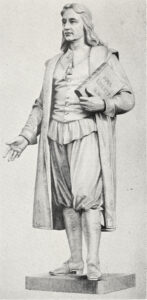
It’s important to realize that although the Pilgrims rejoiced that the land on which they were settling was available to them, and although they saw its availability as evidence of God’s favor upon them, the members of this community of faith
never associated the epidemic that preceded their arrival with some form of heavenly punishment for the natives who lived in the vicinity, and in fact professed consistent respect and even admiration for the surviving Indians they encountered. They particularly noted their physical health and strength, their ingenious devices for hunting and fishing, and their regal posture and tall structure—making them notably larger than typical Europeans.…The charismatic Puritan pastor Roger Williams, ultimate founder of Rhode Island, later spoke for many of the earliest settlers when he declared that “Nature knows no difference between Europe and Americans in blood, birth, bodies and &c God having of one blood made all mankind.…Boast not proud English..…Thy brother Indian as by birth as Good.”

Rather than viewing the natives as victims of divine wrath, they preferred to see themselves as the beneficiaries of special protection. Cold, hungry, and desperate, deposited by winds, waves, and errant navigation some 250 miles from their original destination, they concluded that a higher power had brought them to precisely the right place.[68]
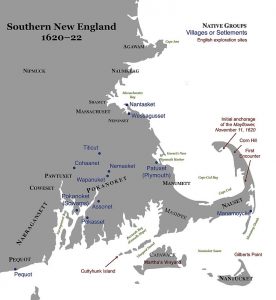
The Pilgrims “never associated the epidemic that preceded their arrival with some form of heavenly punishment for the natives who lived in the vicinity, and in fact professed consistent respect and even admiration for the surviving Indians they encountered.”
—Michael Medved—
Blessing After Blessing
 In the first volume of his multi-volume history of the United States, America: The Last Best Hope, William J. Bennett emphasizes the Pilgrims’ extreme good fortune to have encountered Indians with whom they were able to forge a friendship. Of course, the members of the Plymouth settlement saw this “good fortune” as divine favor and blessing. Bennett writes of Squanto’s help in the planting season of 1621, which quite probably saved the lives of the Pilgrims who’d survived the winter.
In the first volume of his multi-volume history of the United States, America: The Last Best Hope, William J. Bennett emphasizes the Pilgrims’ extreme good fortune to have encountered Indians with whom they were able to forge a friendship. Of course, the members of the Plymouth settlement saw this “good fortune” as divine favor and blessing. Bennett writes of Squanto’s help in the planting season of 1621, which quite probably saved the lives of the Pilgrims who’d survived the winter.
Then, in March of that same year
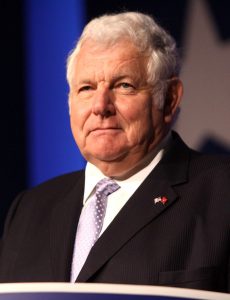
the Pilgrims signed a treaty with Massasoit, the chief of the Wampanoag tribe. This treaty lasted. In it, the settlers and the Indians pledged mutual friendship and support.…
It made perfect sense that “the Pilgrims gave credit to God for the survival of their little band.”
—William J. Bennett—
By autumn of 1621, a successful harvest was crowned by a three-day feast. Chief Massasoit of the Wampanoags brought ninety of his braves for a festival of foot races, wrestling matches, and eating. Deer, turkey, ducks, game birds, rabbits, fish, and other rich foods—many new to the English pilgrims—formed the fare of this first Thanksgiving holiday. Imagine the trust and friendship that had been built up in just a few months. What courage to invite into their settlement ninety strong warriors who might easily have overpowered and wiped out this little community. Small wonder the Pilgrims gave credit to God for the survival of their little band. And little wonder, too, that Americans ever after found in these Pilgrim fathers’ setting foot on Plymouth Rock a source of inspiration.[69]
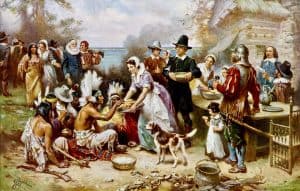
Exacerbating Racial Tensions by Pushing Guilt Over Gratitude
How ironic that Thanksgiving has been turned[70] into a time to pound white Europeans and their descendants for oppressing people of color, including, to begin with,[71] the Native Americans. While many SJWs know exactly what they’re doing when they use CRT to make white people feel guilty rather than grateful,[72] others may not. Many even may have good intentions, but, as I wrote in chapter 2, I believe enticing people to feel guilty for the blessings God gives is effectively spitting in His face. Remember that in chapter 2 we examined a list of 17 Bible passages[73] that offer not one shred of evidence that guilt is a legitimate response to God’s benevolent provision.
When one racial group is made to feel guilty for “privilege” while another is persuaded to see themselves as victims of the other group’s supposed advantages, tensions between the races are exacerbated, and it’s easy to see why. CRT divides! Whites have been and are oppressors, says CRT and the rest of the social justice narrative, and blacks and other minorities are victims.

For what are whites being made to feel guilty? Not just for the blessings God currently has given (blessings that clearly aren’t, by the way, exclusive to whites), but also for wrongs committed against blacks in the increasingly distant past. As bad as slavery, lynchings, and Jim Crow laws were, these are non-existent in American society today. Nevertheless, say SJWs, wealth and resources must be taken from “privileged whites” and redistributed to blacks to compensate for past wrongs.
Yet, as black economist Walter Williams has said, “If one person has a right to something he did not earn, of necessity it requires that another person not have a right to something that he did earn.”[74] This cannot foster unity between the races! Instead, it will generate envy, hatred, resentment, and long-lasting conflict.
If one person has a right to something he did not earn, of necessity it requires that another person not have a right to something that he did earn.
—Walter Williams—
Letting History Speak for Itself
Let’s return to Plymouth and consider the Pilgrims’ situation once more. Here we must pause to make sure we are not being misunderstood.
-
- We readily acknowledge there were oppressive Europeans during the early part of the 17th century and beyond. One of them was Captain Thomas Hunt,[75] who kidnapped Squanto and took him to Europe where he was sold into slavery.
- We also hasten to affirm the Pilgrims did not relate perfectly to the Native Americans they encountered after they arrived. They were human and therefore flawed, just like the rest of us.
- Finally, we acknowledge that a number of practical realities[76] encouraged the good relations that emerged between the Pilgrims and the Wampanoags. Each community needed the other. This a common scenario when treaties are signed, but we ought not to allow this fact to overshadow in our minds the good will that existed between these two otherwise very different parties.
Generally speaking, as we hone in on the Pilgrims and their experiences at Plymouth, we do not find racism in their posture toward the Indians. Put another way, we find absolutely no evidence of an attitude of white supremacy on their part.
Rather, we see in them a recognition of the Native Americans as fellow human beings. Were this not so, they never would have welcomed Squanto into their community as a friend and a brother. These are the realities we discover when we let history speak for itself, when we come to it without a preconceived agenda.
The Antidote to Racism
It is high time we learned the relational lessons the Pilgrims’ example teaches. How did these men, women, and families who came to America from Holland, after arriving in Holland from England ten years prior, avoid racism? The short answer is as clear as history can make it. Gratitude! Moreover, just as gratitude serves to prevent racism, it also cures it.
Just as gratitude serves to prevent racism, it also cures it.
The gratitude of which I speak is not one that offers only token acknowledgements for trivial benefits or blessings. No, this gratitude acknowledges God’s provision, even in the throes of sorrow and loss. Remember that various sicknesses had taken the lives of half the Pilgrims’ company during the previous winter. Even in their grief, these devout men and women still acknowledged God’s provision and His working in their lives.

The lesson is that our response to the bad things that happen to us is key. In the midst of suffering and loss, if we can realize that were it not for God’s grace and protection we would have had to endure a great deal more, we can turn to God with appreciative hearts and can avoid becoming bitter and resentful.
There’s more. Gratitude is the enemy of pride. In other words, grateful people also are humble people. They know they’re not better than others, so they don’t relate to others with an attitude of superiority or with a preconceived expectation they deserve special privileges. Ironically, by working to destroy gratitude and replace it with guilt, social justice crusaders are throwing cold water, not just on gratitude, but also the humility it fosters. This won’t lead to racial reconciliation, because it cannot. Racism is rife with arrogance and condescension.

Finally, consider this. Because CRT is incompatible with gratitude, it fuels ingratitude. It does this is by promoting the idea that some are oppressed merely because of the color of their skin, so they therefore are victims. This is a “victimhood” manufactured by a manipulative, Marxist ideology. If a person feels he or she is a victim, that individual necessarily will be ungrateful, resentful, and angry. In an excellent Prager University video available at https:// bit.ly/2IxaBxF, Dennis Prager explains.
A Quick Review
Let’s review.
-
- You show me someone who’s truly grateful, and I’ll show you someone who is genuinely humble.
- You show me someone who’s humble, and I’ll show you someone who cannot be a racist.
- In light of the two items listed above, we should understand racism in this country cannot be effectively countered unless gratitude and humility are upheld and cultivated. This means swimming against the cultural current. These qualities fly in the face of numerous toxic but prevailing 21st-century cultural forces and influences, including the entitlement mentality promoted by many politicians.
- Gratitude and humility also fly in the face of critical race theory and other social justice narratives. Because this is true, CRT and other components of the social justice movement never will bring the races closer together. Instead, they inevitably will push them further apart.
The Pilgrims’ example teaches us that for both individuals and societies, authentic gratitude and humility are found and cultivated in the context of
-
- an awareness of God’s existence and authority,
- an awareness of His blessings, even in the context of a fallen world filled with challenge and loss (this cultivates gratitude),
- an awareness of God’s expectations of human beings, which enhances
- an individual and corporate awareness of human accountability to God (this negates pride), and
- a willingness to fulfill our responsibilities to Him, with His help.
Obviously, in light of all of this, it is clear that America needs to return to the God of the Bible—the very God the Pilgrims worshiped and served.
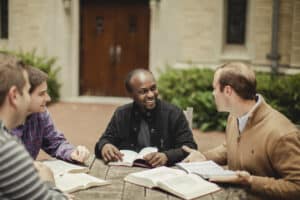
You can help make that happen.
-
- Make sure you have a right relationship with God. If you haven’t placed your own personal faith in Christ for salvation, turn to page XX and read “How to Become a Christian. I encourage you to decide to give your life to Christ today. Then
- cultivate gratitude and humility in your own life, and
- let these qualities spill over into your relationships with others.
An important part of this process is thanking God for His blessings on a daily basis. If you’re not already doing this, start today — and keep going.
Let’s demonstrate to our nation and the world the utter futility of CRT — and the transforming power of being grateful to a loving, merciful, and benevolent God!
Ready, set, go!
NOTES:
Chapter 1
[1] William Bradford, Of Plymouth Plantation. Portcullis Books. Kindle Edition. Edited by Harold Paget. — https://amzn.to/2DkZMxI
[1] https://bit.ly/2sf8URX — https://thefederalist.com/2017/11/22/first-thanksgiving-nothing-like\-taught/
[1] https://bit.ly/2OpFmKl — https://wallbuilders.com/celebrating-thanksgiving-america/
[1] Writing about himself and his own people in the third person, William Bradford wrote, “Squanto stayed with them, and was their interpreter, and became a special instrument sent of God for their good, beyond their expectation.” William Bradford, Of Plymouth Plantation (p. 87). Portcullis Books. Kindle Edition. Edited by Harold Paget. Book II, Chapter I.
[1] https://bit.ly/34pD9UK — https://wordfoundations.com/2017/11/22/a-holy-nation/
[1] https://bit.ly/2QZhkqS — https://wordfoundations.com/2017/11/30/strangers-and-pilgrims/
[1] https://bit.ly/3hKow7a — https://pilgrimhall.org/ap_voyage_mayflower_speedwell.htm
[1] https://bit.ly/2DkV3vH — https://www.history.com/topics/colonial-america/mayflower
[1] https://bit.ly/2QSFcN6 — https://historyofmassachusetts.org/plymouth-colony-timeline/
[1] https://bit.ly/33hhrRi — https://wordfoundations.com/mayflower-compact/
[1] William Bradford, Of Plymouth Plantation (p. 74-75). Portcullis Books. Kindle Edition. Edited by Harold Paget. Book I, Chapter IX. Go to https://bit.ly/2XP0Gvz (https://wordfoundations.com/17040-2/) for more information.
[1] Larry Schweikart, 48 Liberal Lies About American History (that You Probably Learned in School), (New York: Sentinel, 2008), 178. Schweikart writes, “Of the Mayflower’s 102 Pilgrims who arrived at Plymouth Rock, only 46 remained alive by the following spring.”
[1] You can read the names of those who died and the dates of their deaths (as best members of the Plymouth party were able to record them) on this timeline: https://bit.ly/2sfegg1 — https://historyofmassachusetts.org/plymouth-colony-timeline/.
[1] Bradford Smith, Bradford of Plymouth, (New York: J. B. Lippincott Company, 1951), 146-147. For Bradford Smith’s vivid description of the darkest days of the Pilgrims’ first winter at Plymouth, go to https://bit.ly/2Dhopv3 — https://wordfoundations.com/17100-2/.
[1] https://bit.ly/34oTiJQ — https://www.biography.com/history-culture/squanto
 [1] In this interview from CBN — https://bit.ly/2OP9ptw (https://www2.cbn.com/article/thanksgiving/thanksgiving-and-true-story-squanto) — Eric Metaxas, who wrote a book about Squanto — https://shorturl.ac/7b906 (https://wordfoundations.com/wp-content/uploads/2019/11/Squanto-and-the-Miracle-of-Thanksgiving-Eric-Metaxas.pdf_ — states, “And it just so happens that he [Squanto] grew up on the very spot where they had settled. This was his home that had been abandoned, and now he was back in his village, and they basically adopted him. He had no place to go. They became his family.”
[1] In this interview from CBN — https://bit.ly/2OP9ptw (https://www2.cbn.com/article/thanksgiving/thanksgiving-and-true-story-squanto) — Eric Metaxas, who wrote a book about Squanto — https://shorturl.ac/7b906 (https://wordfoundations.com/wp-content/uploads/2019/11/Squanto-and-the-Miracle-of-Thanksgiving-Eric-Metaxas.pdf_ — states, “And it just so happens that he [Squanto] grew up on the very spot where they had settled. This was his home that had been abandoned, and now he was back in his village, and they basically adopted him. He had no place to go. They became his family.”
[1] Schweikart. Go to https://bit.ly/2XOYnst (https://wordfoundations.com/17038-2/) for more information.
[1] https://shorturl.ac/7b8zp — https://wordfoundations.com/wp-content/uploads/2019/11/A-Commune-Called-Plymouth-What-the-Pilgrims-Taught-Us-About-Socialism-AMAC-The-Association-of-Mature-American-Citizens.pdf
[1] https://bit.ly/2DhrU4u — https://fee.org/articles/aristotle-understood-the-importance-of-property/
[1] William Bradford, Of Plymouth Plantation (pp. 116-117). Portcullis Books. Kindle Edition. Edited by Harold Paget. Book II, Chapter IV Go to https://bit.ly/34mFjo7 (https://wordfoundations.com/17026-2/) for more information.
[1] William Bradford, Of Plymouth Plantation (p. 124). Portcullis Books. Kindle Edition. Edited by Harold Paget. Book II, chapter IV Go to https://bit.ly/2QWjh7B (https://wordfoundations.com/17076-2/) for more information.
[1] https://bit.ly/2rw5euE — https://historyofmassachusetts.org/plymouth-colony-timeline/
[1] Ibid.
[1] William Bradford, Of Plymouth Plantation (p. 124). Portcullis Books. Kindle Edition. Edited by Harold Paget. Book II, chapter IV Go to https://bit.ly/2Dlai8a (https://wordfoundations.com/17087-2/) for more information.
[1] William Bradford, Of Plymouth Plantation (p. 124). Portcullis Books. Kindle Edition. Edited by Harold Paget. Book II, chapter IV Go to https://bit.ly/2qMjQpX (https://wordfoundations.com/17089-2/) for more information.
[1] D. James Kennedy and Jerry Newcombe, What If Jesus Had Never Been Born? (Nashville: Thomas Nelson, 1994), 121-122. Kennedy and Newcombe write,
The result [of the Pilgrims’ adaption of a free market system] was that the following harvest was a tremendous, bountiful harvest, and abundant thanksgiving was celebrated in America. Had they not gone into private enterprise, it is likely the Pilgrims would have died off. Note it well: When socialism was abandoned, Thanksgiving was established! When socialism is reinstated in America, thanksgiving will be abolished! That is the history of America — a lesson that we have all too easily forgotten.
[1] https://bit.ly/3zrc8Pj — https://wordfoundations.com/socialism-of-jamestown-and-plymouth-fails/
Chapter 2
[1] https://bit.ly/3G30qRQ — https://www.azquotes.com/quote/851836
[1] https://bit.ly/3Ed4fCO — https://www.frontpagemag.com/david-horowitz/
[1] https://shorturl.ac/7baed— https://wordfoundations.com/wp-content/uploads/2019/12/Why-Socialism-Doesnt-Work-as-Learned-by-a-Waiter-AMAC-The-Association-of-Mature-American-Citizens.pdf
[1] https://bit.ly/3fQLw6z — https://wordfoundations.com/word-foundations-posts-that-sound-the-warning-about-critical-race-theory/
[1] https://bit.ly/3UzftXm — https://en.wikipedia.org/wiki/Thanksgiving_(United_States)#Harvest_festival_observed_by_the_Pilgrims_at_Plymouth
[1] https://bit.ly/3hpxF7L — https://wordfoundations.com/some-things-you-need-to-know-about-critical-race-theory/
[1] https://bit.ly/3TpsjXb — https://capstonereport.com/2019/12/04/making-sense-of-matthew-halls-stand-on-identity-politics/33413/
[1] Progress includes points cited in these two excellent PragerU videos:
https://shorturl.ac/7bcbc — https://www.prageru.com/video/is-america-racist and https://shorturl.ac/7bcba — https://www.prageru.com/video/how-to-end-white-privilege
[1] https://shorturl.ac/7bcbj — https://www.prageru.com/video/playing-the-black-card
[1] https://shorturl.ac/7bcbq — https://www.dailymail.co.uk/news/article-9749517/An-anti-racist-author-Robin-DiAngelo-makes-728K-year-speaking-engagements.html
[1] https://shorturl.ac/7bcbu — https://atomicquote.com/author/thomas-sowell/quote/the-crucial-question-is-not-whether-evils-exist-but-whether-the-evils-of-the-past-or-present-are-automatically-the-cause-of-major-economic-educational-and-other-social-disparities-today-the-b?image_id=1
[1] https://www.azquotes.com/quote/1405077
[1] https://bit.ly/3UkiZW9 — https://wordfoundations.com/2019/04/07/social-justice-and-biblical-christianity-are-incompatible-heres-why-part-1/
[1] https://bit.ly/3UHspui — https://wordfoundations.com/2019/04/26/social-justice-biblical-christianity-incompatible-heres-why-part-2/
[1] https://bit.ly/3zXhoxi — https://babylonbee.com/news/thanksgiving-day-officially-changed-to-check-your-privilege-day/
[1] Ibid.
[1] https://bit.ly/3UgFbQO — https://wordfoundations.com/gods-blessings-are-nothing-of-which-to-be-ashamed/
[1] https://bit.ly/3hrOnDt — https://www.biblegateway.com/passage/?search=+Luke+18:18-27%3B+Matthew+19:16-30%3B+Mark+10:17-27&version=NKJV
[1] 1 Timothy 6:17: Command those who are rich in this present age not to be haughty, nor to trust in uncertain riches but in the living God, who gives us richly all things to enjoy. 18 Let them do good, that they be rich in good works, ready to give, willing to share, 19 storing up for themselves a good foundation for the time to come, that they may lay hold on eternal life.
[1] https://bit.ly/3TixQyL — https://fbccov.org/your-possessions-and-the-kingdom-of-god/
[1] William Hendriksen, The Gospel of Luke, (Grand Rapids: Baker Book House, 1978), 834.
[1] https://bit.ly/3hrOnDt — https://www.biblegateway.com/passage/?search=+Luke+18:18-27%3B+Matthew+19:16-30%3B+Mark+10:17-27&version=NKJV
Chapter 3
[1] https://bit.ly/3WMCk3B — https://www.azquotes.com/quote/880482
[1] https://bit.ly/3Eg6Bk8 — https://thehill.com/opinion/katie-pavlich/246440-katie-pavlich-america-is-not-racist/
[1] www.wordfoundations.com/socialism-in-early-america/
[1] https://bit.ly/3TlUVR6 — https://mises.org/library/great-thanksgiving-hoax-1
[1] https://bit.ly/3DOSroR — https://www.wordfoundations.com/wp-content/uploads/2019/12/daniel-flynn-human-events-history-thanksgiving.pdf
[1] https://bit.ly/3tcG0hF — https://www.google.com/books/edition/History_of_Plymouth_Plantation/tYecOAN1cwwC?hl=en&gbpv=1&printsec=frontcover#v=onepage&q&f=false
[1] https://bit.ly/2ZA1EPS — https://historyofmassachusetts.org/plymouth-colony-timeline/
[1] See footnote #12.
[1] See footnote #13.
[1] See footnote #14.
[1] See footnote #15.
[1] See footnote #16.
[1] https://bit.ly/3Unl1EH — https://historyofmassachusetts.org/squanto-the-former-slave/
[1] https://bit.ly/3NP3iUe — https://native-american-indian-facts.com/Famous-Native-American-Facts/Squanto-Facts.shtml
[1] Bradford, William. Of Plymouth Plantation (p. 87). Portcullis Books. Kindle Edition. Edited by Harold Paget. Book II, Chapter I.
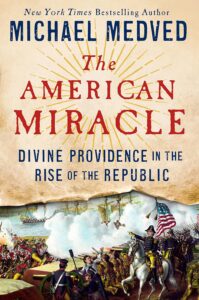 [1] Michael Medved, The American Miracle: Divine Providence in the Rise of the Republic, (New York: Crown Forum, 2016), 27-47.
[1] Michael Medved, The American Miracle: Divine Providence in the Rise of the Republic, (New York: Crown Forum, 2016), 27-47.
[1] https://bit.ly/2Fs2zbl — https://www.history.com/this-day-in-history/mayflower-departs-england
[1] https://bit.ly/E0s0ng — https://en.wikipedia.org/wiki/Patuxet3
[1] Medved, 39.
[1] William J. Bennett, America: The Last Best Hope, Volume 1: From the Age of Discovery to a World at War, 1492-1914, (Nashville: Thomas Nelson / Nelson Current, 2006), 39.
[1] https://bit.ly/3Tl86Sy — https://thefederalist.com/2019/11/25/what-kids-in-portland-public-schools-learn-about-thanksgiving-war-crimes-and-racism/
[1] https://bit.ly/3Egu05b — https://www.americanthinker.com/articles/2019/11/millennials_want_to_get_rid_of_thanksgiving.html
[1] https://bit.ly/3zXhoxi — https://babylonbee.com/news/thanksgiving-day-officially-changed-to-check-your-privilege-day/
[1] https://bit.ly/3UgFbQO — https://wordfoundations.com/gods-blessings-are-nothing-of-which-to-be-ashamed/
[1] https://bit.ly/3tjEcDq — https://www.azquotes.com/quote/571849
[1] https://bit.ly/3UpvQX8 — https://en.wikipedia.org/wiki/Squanto#Abduction
[1] https://bit.ly/3EguRmp — https://thefederalist.com/2017/11/22/first-thanksgiving-nothing-like-taught/
[1] https://www.wordfoundations.com/how-to-become-a-christian/
